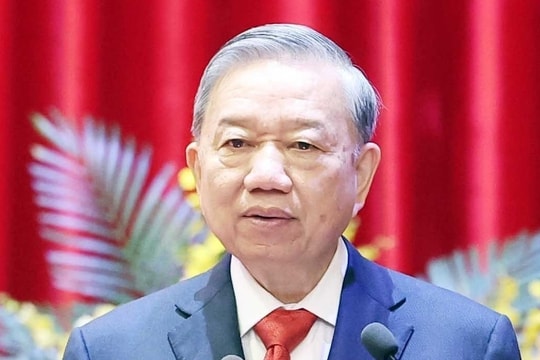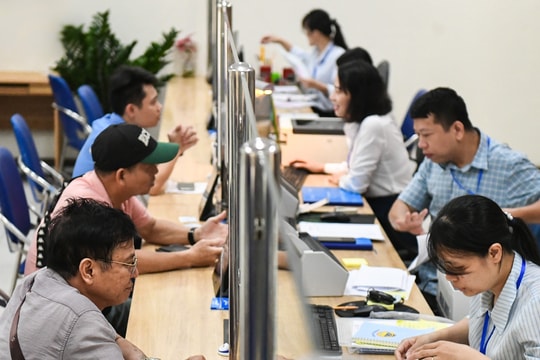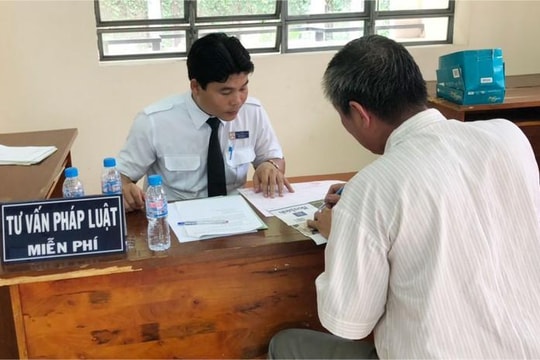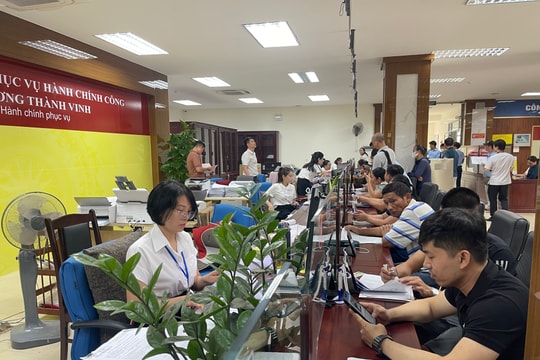'1 law amending 9 laws' has been well prepared, making policy corruption difficult
The legislative technique of using one law to amend many laws is only applied in some urgent cases to immediately handle difficulties and problems that have been clearly identified in the laws.
The Office of the President held a press conference to announce the President's Order on the Law amending and supplementing a number of provisions of 9 laws passed by the 15th National Assembly at its first extraordinary session on the morning of January 24, including: Law on Public Investment, Law on Investment under the Public-Private Partnership model, Law on Investment, Law on Housing, Law on Bidding, Law on Electricity, Law on Enterprises, Law on Special Consumption Tax, Law on Civil Judgment Enforcement.
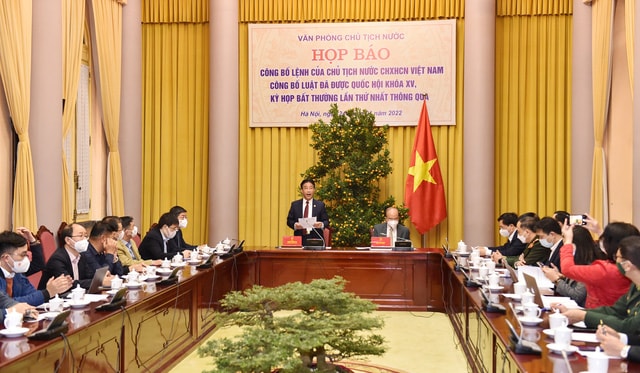 |
| Deputy Head of the Office of the President Pham Thanh Ha chaired the press conference - Photo: VGP/Duc Tuan |
Accordingly, the amendment and supplementation of a number of articles of the 9 laws stem from the need to institutionalize the Party's guidelines and policies and the State's policies on building and perfecting laws to remove difficulties and obstacles for production, business activities and social life, especially in the context of both preventing and fighting the COVID-19 pandemic and recovering and developing the socio-economy; at the same time, to meet requirements arising from practices related to investment, business and corporate governance activities; cybersecurity protection; civil judgment enforcement; implementing the policy of socializing investment in the national power transmission system; encouraging investment in the production and use of environmentally friendly means of transport.
The Law consists of 11 articles, including: 9 articles amending and supplementing a number of articles of 9 current laws, 1 article regulating transitional provisions and 1 article regulating implementation. Accordingly, this Law takes effect from March 1, 2022.
Notably, Article 3 of the draft Law stipulates the implementation of decentralization to the provincial People's Committee to decide on investment policies for housing construction projects and urban areas. Accordingly, the Prime Minister only approves investment policies for housing construction projects (for sale, lease, lease-purchase), urban areas in the following cases: Investment projects with a land use scale of 300 hectares or more, or a population scale of 50,000 people or more. Investment projects in accordance with the provisions of the law on cultural heritage, regardless of the scale of land area and population within the scope of protection area I of relics recognized by competent authorities as national relics, special national relics; within the scope of protection area II of relics recognized by competent authorities as special national relics in the World Heritage List.
In order to reduce costs and time for enterprises and ensure the consistency of the legal system in the implementation of enterprise information disclosure, Clause 5, Article 6 of the draft Law amends and supplements Point d, Clause 1, Article 109 of the Law on Enterprises to stipulate that mid-year financial reports of enterprises that make information disclosure are not required to be audited.
After that, leaders of ministries and branches discussed and clarified issues of interest to the press.
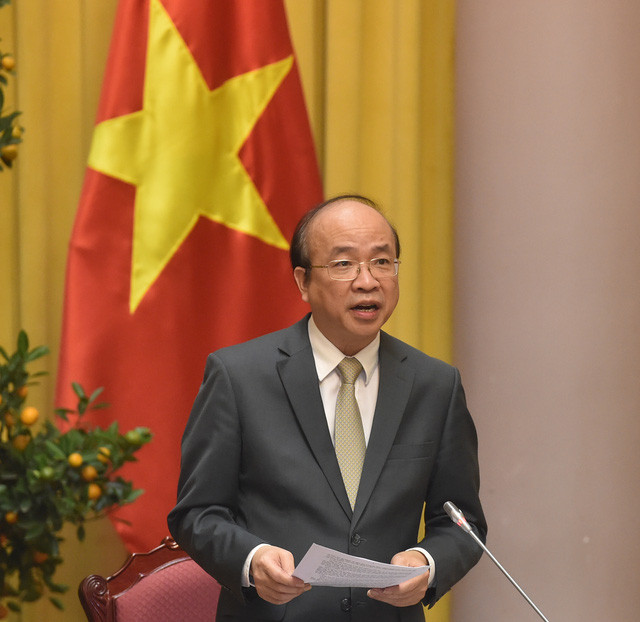 |
| Deputy Minister of Justice Phan Chi Hieu: The amendments and supplements are all aimed at facilitating the practical application of the law for investment and business activities - Photo: VGP/Duc Tuan |
Only apply '1 law amending many laws' when really necessary and urgent.
Should the application of the form "1 law amending many laws" be applied regularly, not just at extraordinary sessions, sir?
Deputy Minister of Justice Phan Chi Hieu:The legislative technique of using one law to amend many laws has been stipulated in the Law on Promulgation of Legal Documents 2015. However, this technique is only applied in some urgent cases to immediately handle difficulties and problems that have been clearly identified in the laws. Therefore, in my opinion, we will continue to promote the improvement of the legal system associated with law enforcement in the spirit of the 13th National Party Congress. We should try to limit as much as possible, not abuse this legislative technique, only use it in cases of real necessity and urgency, and should only use it to amend and supplement some specific contents that we have discovered, fully identified, and have had their impact carefully assessed, because using this technique is quite complicated.
So what is the basis for applying "1 law amending many laws" when the regulated fields are different?
Deputy Minister Phan Chi Hieu:As I just mentioned above, this is a new legislative technique and should only be used in cases of real necessity, with urgent needs, especially in areas with close social relationships.
For ease of application, what measures should be taken so that after the Law is promulgated, all organizations and individuals clearly understand the provisions of the Law?
Deputy Minister Phan Chi Hieu:Technically, we will consolidate documents in accordance with the spirit of the Ordinance on Consolidation of Legal Documents. Therefore, organizations and individuals only need to read the consolidated documents. For example, this law amends a number of articles of the Investment Law, we will look up in the consolidated law, thereby easily detecting which regulations have been amended and supplemented and what the content is for synchronous and unified application. In addition, in the coming time, the Ministry of Justice and state management ministries in the fields prescribed in the amended and supplemented law will strengthen the dissemination of laws, fully update information for the business community and people to clearly understand these regulations and apply them synchronously and consistently in practice. We hope that the press agencies will coordinate in propaganda to bring the new contents of the Law amending and supplementing 9 laws into practice.
In this matter, the role of the press is extremely important.
The law amends major issues, so is the impact assessment of the law complete? What measures are there to prevent policy corruption, sir?
Deputy Minister Phan Chi Hieu:In principle, the Law amending and supplementing 9 laws only amends and supplements the major problems and shortcomings that we have discovered over time that have matured and cannot be left uncorrected to immediately overcome difficulties, obstacles, and overlaps. The Law was passed at an extraordinary session, but in 2021, the Government and the Prime Minister directed ministries and branches, including the Ministry of Justice, the Ministry of Planning and Investment, the Ministry of Industry and Trade, and the Ministry of Finance, which are the ministries managing the 4 major areas in the Law, to assess and summarize practices and detect difficulties and obstacles. All major policies have been assessed for impact by the ministries and reported to the Government. Before reporting to the Government, according to the provisions of the Law on Promulgation of Legal Documents, the Ministry of Justice conducts specific and detailed appraisals. All policies have been consulted for comments from affected subjects. The Government submitted it to the National Assembly in June 2021. Due to the many tasks on the agenda for the end-of-2021 session, the National Assembly placed it on the agenda for the extraordinary session earlier this year.
The amendments and supplements are all aimed at facilitating the practical application of the law to investment and business activities. Therefore, there is certainly no risk of policy exploitation, because we have identified them quite carefully and specifically, and when they are put into application, they will only be better for investment and business activities.
Regarding anti-policy corruption, we carry out synchronous measures, under the authority of many different agencies. A legal provision may be very good, but if the implementation process is not strict and there is no control mechanism, there is a possibility of policy corruption arising.
During the implementation process, the Ministry of Justice will coordinate with other ministries to pay close attention to this issue and take control measures to minimize policy corruption.
In the issue of preventing and combating corruption, the role of the press is extremely important. We hope that when reporters discover signs of policy corruption, they will promptly report it so that State agencies can take measures to handle it.
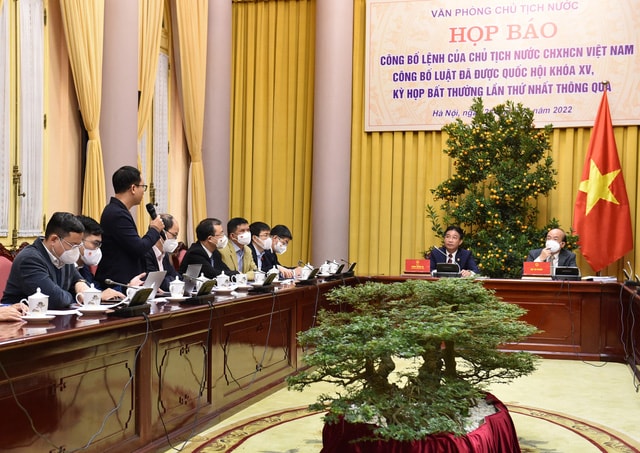 |
| Press agencies asked questions at the press conference - Photo: VGP/Duc Tuan |
Deputy Chairman of the National Assembly's Committee on Justice Do Duc Hong Ha:This is also an issue that voters and people are concerned about. Although recent years have achieved many positive results and progress, on average only 10% of the total assets in corruption and economic cases have been recovered.
The Government has discovered an important bottleneck and in this amendment we have focused on removing that bottleneck. That is, according to the provisions of the current Law on Civil Judgment Enforcement, in some cases, when enforcing a judgment, we must complete the handling of assets in this locality before the civil judgment enforcement agency can be entrusted with the enforcement of judgments in another locality. On average, it takes about 6 months to handle assets in each case and in a case with 5 cases, it takes up to 3 years. The Law on Civil Judgment Enforcement has added a new mechanism, which is the mechanism for handling assets simultaneously in 6 localities with assets that need to be handled. That is one of the important solutions in recovering corrupt assets.
Please tell us more about the partial execution of judgments to resolve the bottlenecks compared to the past. Will the new mechanism create breakthrough results? What are the expectations for asset recovery in the near future?
Deputy Minister of Justice Phan Chi Hieu:In the past, the enforcement of judgments was only delegated once for a case. But in reality, in economic and corruption cases, assets are located in many different localities. If there is no provision for partial enforcement, it will be very difficult to implement. If we wait for the judgment to be completed in one locality before enforcing it in another, it may create certain loopholes for related parties to lose assets during that period and may lead to the fact that the asset recovery rate in economic and corruption cases, including bank credit cases, is low.
Therefore, this amended and supplemented Law opens up a mechanism that can authorize the execution of assets in many localities to simultaneously carry out related work to ensure the effectiveness of asset recovery.
Along with removing institutional and legal difficulties, we have high expectations that in the coming time, specifically in 2022, civil enforcement will be more effective, especially in recovering assets from economic and corruption cases.


